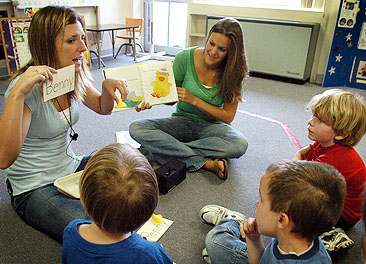I’ve written before about the value of early childhood interventions, including not just pre-K schooling, but also things like home nursing visits that begin at the moment of birth. One of the reasons that more and more people are starting to focus on this is because of the results of the Bucharest Early Intervention Project, in  which a group of Romanian orphans were randomly assigned either to foster homes or to remain in their orphanages. The Romanian children are now entering their teen years, and the LA Times reports on the latest results from the project:
which a group of Romanian orphans were randomly assigned either to foster homes or to remain in their orphanages. The Romanian children are now entering their teen years, and the LA Times reports on the latest results from the project:
In the new study, the team scanned the brains of 74 of the Bucharest children, now ages 8 to 11, using magnetic resonance imaging. What they found was striking: Brains of children who had remained in institutions had less white matter — the type of tissue that connects different regions of the brain — than orphans who were placed in foster care or children living with their own families.
Reductions in white matter have been found in numerous neurological and psychiatric conditions, including autism, schizophrenia and attention deficit hyperactivity disorder, or ADHD. Study senior author Charles Nelson, a developmental neuroscientist at Children’s Hospital Boston, said the white-matter changes were probably related to a difference that the scientists had noticed earlier in the project: Children in institutions had less electrical activity in their brains — specifically, a kind known as “alpha power” — than those who had gone to foster homes.
“If a normal kid is like a 100-watt light bulb, these kids were a 40-watt light bulb,” Nelson said.
You want to know the value of the social sciences? Here you go. There are two big things we could do if we really wanted to improve our childrens’ future: aggressively get rid of all the remaining lead in our soil and in old houses — all of it — and spend a bunch of money on high-quality early childhood interventions among poor and working-class families. If we don’t think we have the money — an argument I’ll put off to another day — we should take it out of the K-12 budgets. We’d be better off with 100% more pre-K and 20% less K-12 than we are with our current funding priorities.
The investment return on these two things is probably astronomical. Unfortunately, like all good things, they cost money and require rigorous execution, something that’s nearly impossible because one of our major parties will never consider shifting money out of K-12 and the other is run by nihilists who are unwilling to spend money on anything other than national defense. So instead we twiddle our thumbs, doing nothing until the evidence in favor of these child-centered programs is literally bulletproof, something that might take a while since social science evidence is, by its nature, almost never bulletproof.
In the meantime, though, there’s plenty of bipartisan support for ethanol subsidies. Welcome to America.
For more on this topic from me, click here. And here. For a terrific cover story on the topic from Jon Cohn in the New Republic, click here.


















